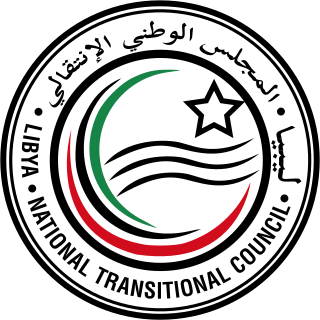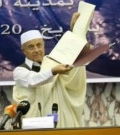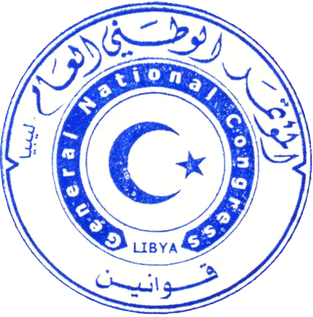Libya's history covers its rich mix of ethnic groups added to the indigenous Berber tribes. Berbers have been present throughout the entire history of the country. For most of its history, Libya has been subjected to varying degrees of foreign control, from Europe, Asia, and Africa. The modern history of independent Libya began in 1951.

The Politics of Libya is in an uncertain state due to the collapse of the Libyan Arab Jamahiriya in 2011 and an ongoing civil war between the Council of Deputies in Tobruk and its supporters, the New General National Congress in Tripoli and its supporters, and various jihadists and tribal elements controlling parts of the country.

Field Marshal Khalifa Belqasim Haftar is a Libyan military officer and the head of the Libyan National Army (LNA), currently engaged in the Second Libyan Civil War. On 2 March 2015, he was appointed commander of the armed forces loyal to the elected legislative body, the Libyan House of Representatives.

Ali Abdussalam Tarhouni is a Libyan economist and politician. Tarhouni served as the minister for oil and finance on the National Transitional Council, the provisional governing authority in Libya, from 23 March to 22 November 2011. He acted in the capacity of interim prime minister of Libya during the departure of outgoing incumbent Mahmoud Jibril from 23 October 2011 until Abdurrahim El-Keib was formally named to succeed Jibril on 31 October.

The aftermath of the Libyan Civil War has been characterized by marked change in the social and political order of Libya after the overthrow and killing of Muammar Gaddafi in the 2011 Libyan Civil War. The country has been subject to ongoing proliferation of weapons, Islamic insurgencies, sectarian violence, and lawlessness, with spillovers affecting neighboring countries including Mali.

Elections for a General National Congress (GNC) were held in Libya on 7 July 2012, having been postponed from 19 June. Once elected, the General National Congress was to appoint a Prime Minister and Cabinet. The GNC was originally to be charged with appointing a Constituent Assembly to draw up Libya's new constitution, but the National Transitional Council (NTC) announced on 5 July that the Assembly would instead be directly elected at a later date.

The Justice and Construction Party or Justice and Development Party is the political party in Libya associated with the Muslim Brotherhood. It was officially founded on 3 March 2012 in Tripoli. The party advocates Islamism.

Constitutional Assembly elections took place in Libya on 20 February 2014. Nominations for elections to the constituent assembly started on 6 October 2013; registration for candidates to the assembly was over as of 11 November 2013. The assembly will be composed of 20 members each from Libya's three regions: Tripolitania, Cyrenaica and Fezzan. The work of the committee is expected to last from March 2014 until July 2014. The constitutional declaration submitted in August 2011 by the formerly ruling National Transitional Council indicated that Congress itself would appoint the commission; however the General National Congress (GNC) voted instead to hold an election for the selection of individuals to the constitutional commission. The constitutional commission will draw up the constitution, which will then be up for vote in a referendum. As of early January 2014, 1,001,910 voters had registered via SMS.

Nouri Abusahmain is a Libyan politician. He is a major figure on the Islamist side of the 2014 Libyan Conflict and founder of the LROR group which is considered "terrorist" by the internationally recognized Libyan parliament. He is reported to have rigged proceedings of the General National Congress while serving as its president.

Local elections were held in several municipalities in Libya during 2012.

The Second Libyan Civil War is an ongoing conflict among rival factions seeking control of the territory and oil of Libya. The conflict at the beginning was mostly between the House of Representatives (HoR) government that was controversially elected in 2014, also known as the "Tobruk government"; and the rival General National Congress (GNC) government, also called the "National Salvation Government", based in the capital Tripoli, established after Operation Odyssey Dawn and the failed military coup.

The Libya Shield Force is an armed organisation formed in 2012 out of anti-Gaddafi armed groups spread throughout Libya. The Libyan parliament designated much of the Libya Shield Force as terrorist and elements of the Libya Shield Force were identified as linked to al-Qaeda as early as 2012.

Salwa Bugaighis was a Libyan human rights and political activist. She was assassinated in Benghazi, Libya on June 25, 2014.
The following lists events that happened in 2014 in Libya.

The Libyan Crisis refers to the ongoing conflicts in Libya, beginning with the Arab Spring protests of 2011, which led to a civil war, foreign military intervention, and the ousting and death of Muammar Gaddafi. The civil war's aftermath and proliferation of armed groups led to violence and instability across the country, which erupted into renewed civil war in 2014. The ongoing crisis in Libya has so far resulted in tens of thousands of casualties since the onset of violence in early 2011. During both civil wars, the output of Libya's economically crucial oil industry collapsed to a small fraction of its usual level, with most facilities blockaded or damaged by rival groups, despite having the largest oil reserves of any African country. U.S. President Barack Obama stated on 11 April 2016 that not preparing for a post-Gaddafi Libya was probably the "worst mistake" of his presidency.

The Government of National Accord is an interim government for Libya that was formed under the terms of the Libyan Political Agreement, a United Nations-led initiative, signed on 17 December 2015. The agreement has been unanimously endorsed by the United Nations Security Council which has welcomed the formation of a Presidency Council for Libya and recognized that the Government of National Accord is the sole legitimate executive authority in Libya. On 31 December 2015, Chairman of the Libyan House of Representatives, Aguila Saleh Issa declared his support for the Libyan Political Agreement. Ever since, the General National Congress has criticized the unity government on multiple fronts as biased in favor of its rivals, the House of Representatives.
This is a detailed timeline of the Libyan Civil War (2014–present).














